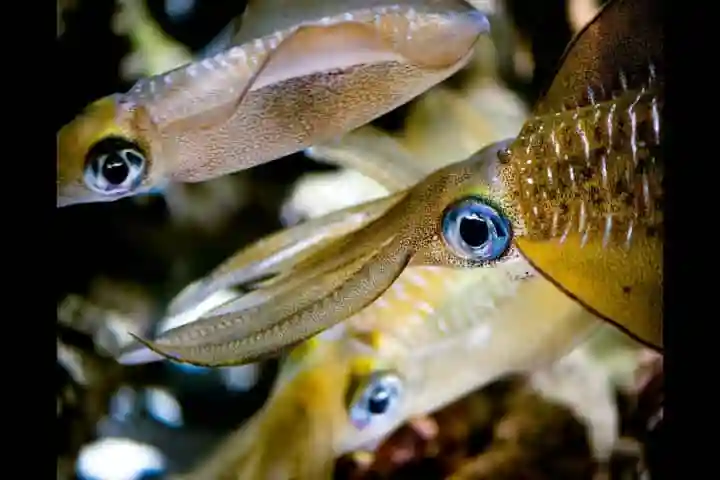Scientists were in for a pleasant surprise when they found that male squids not particularly known as loving fathers, play a role of concerned parent. It was observed for the first time in the small squid, bigfin reef squid, found throughout the world’s coral reefs.
After resolutely fighting for mating, the male usually stays close to the female ensuring she doesn’t mate others. When she is ready to lay the eggs — after she has found a safe coral crevice that protects them from current and predators — she does so multiple times. Guarding for a short while, the male moves on, presumably to mate with other females.
According to an article in nationalgeographic.com, biologist Eduardo Sampaio discovered what can be described as strange. The male, following pairing with the female, drove the other male rivals away by waving of tentacles and flashing his white skin with black stripes. He then visited the crevice, chosen for egg-laying and returned.
Sampaio who is a Ph.D. student at the University of Lisbon in Portugal and the Max Planck Institute of Animal Behaviour in Germany said: “We weren’t sure what he was doing. It was something we’d never seen before.”
Sharing this with Samantha Cheng, the American Museum of Natural History (New York City) biodiversity scientist, he came to know that she had recorded in 2013 the same actions among Indonesian male bigfin reef squid. This kind of behaviour had not been mentioned before in the scientific literature about any squid, octopus, or other cephalopod.
Sampaio and Cheng detailed their observations in the journal Ecology, explaining it as an instance of parental care – never observed before in squids. Probing of location is common before laying of eggs by the male but not parental care, which is extremely rare among cephalopods.
Unable to explain it, scientists, says Sampaio, agree that it shows that male-female squid dynamics are “many-fold more complex than what we had previously thought. We have so much more to learn.”
Also read: Defying age, Cuttlefish has an "elephant's" memory
Comparing the Indonesian video of Cheng with Sampaio’s Egyptian one, researchers concluded that the location probing was intentional, not a random occurrence. It was also found that other males at times mate with the female when she is left alone.
Researchers were confounded with this behaviour as it endangered the male’s reproductive success. Unable to know wihat the male does in the crevice, Sampaio said the scientists suggest that the male could be “cleaning the area, making sure it's a good substrate to attach the eggs onto, checking there isn’t another male—or a predator—lurking there, and that it’s a safe location for the eggs.”
This behaviour pointed in the direction of the male squid investing more in his genes being passed on than believed earlier.
Among cephalopods in general and squids in particular, it is the females who take care of the eggs till they hatch. They clean the eggs with their arms and through their siphon and arms, increase waterflow to provide oxygen. With males playing no role, in many species, the females die once the eggs hatch.
Also read: 890 million years old, Turner’s sponge fossil maybe the first sign of animal life on Earth
Surprised at this behaviour, cephalopod expert Fernando Ángel Fernández-Álvarez, a postdoctoral research fellow at the Irish Research Council and National University of Ireland Galway remarked: “I’ve never seen anything like this in cephalopods.”
Though not part of the study, Fernández-Álvarez believes the findings are sound. “These [dominant] males usually don’t go far from the female because another male could mate with her.” He averred that there is a need to study more mating of cephalopods in the wild.
On the other hand, Sampaio and Cheng are connecting with scientists globally to find out if bigfin reef squid practice this mating behaviour elsewhere.
The study does show that other cephalopods are likely to have more sophisticated mating lives than we ever imagined.
Summing up well, Sampaio said: “The more we learn about squid, the more we’re blown away by their complexities and quirks.”




















